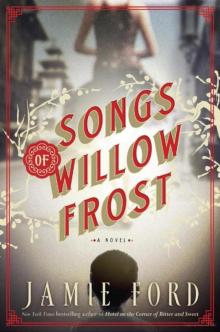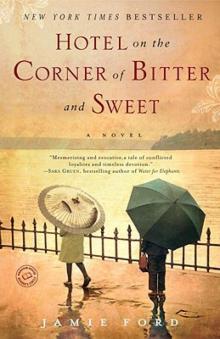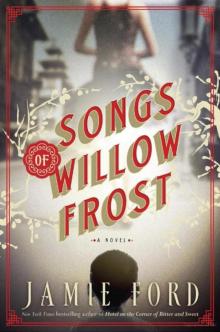- Home
- Jamie Ford
Love and Other Consolation Prizes Page 8
Love and Other Consolation Prizes Read online
Page 8
A black man in a blue tuxedo with a bow tie hanging untied around his neck was tinkering with a melody on a grand piano. Ernest watched as he’d stop, dip a pen into a bottle of ink, mark a few notes on a sheet of paper, and then resume playing. He sang a few whispered words of rhyme and song here and there, nodding and counting. The man stopped playing when he noticed them.
“Mayflower!” he said as he gave Maisie a hug. “And this young fellow must be the new houseboy—I mean, the only houseboy. You’ll make a fine coachman someday, son.”
Ironically, just as he was being called son Ernest realized he hadn’t actually been adopted as a son, or a stepbrother, or a member of a real family. They were making a servant out of him—hired help—without causing anyone the trouble of having to hire. He paused, reflecting, excited but nervous, and a tad angry at having been shuffled off once again. But more than anything, he was hopeful.
A job is better than that school any day, Ernest thought. Though he wondered what kinds of chores he’d be doing in such a fancy place. He was terrible at kitchen work.
“Madam Flora’s big idea.” Maisie shook her head. “I wanted another girl, but what do we go and get—a boy.”
“What about me?” the piano player asked. “I ain’t so bad, am I?”
“Yeah, but you go home in the morning,” Maisie reminded him, laughing.
At least she can actually smile, Ernest noted. And she seemed quite popular with a handful of young women in lavish dresses who descended the stairs and kissed Maisie on the cheek or gave her a quick hug, or tousled her hair as they passed by. They all greeted Ernest, waving, or giggling mischievously. They cooed and called him honey and doll. One of them said, “Look at our darling houseboy, he’s just so adorable,” as she hugged him, pressing his cheek into her perfumed bosom. Ernest’s palms began to sweat, and though he smiled politely and said he was happy to be working there, he still felt like a stranger at someone else’s elegant party. A small part of him was reminded of his weeks on the ship, surrounded by girls who eventually accepted him.
“Those are some of the ladies who live here—you’ll get to know them all in time, I’m sure. And I’m Professor Troubadour,” the man said as he shook Ernest’s hand and peeked over the rims of his thick glasses. “But you can just call me True—cause I never, ever, ever tell a lie.”
Ernest paused, wondering what kind of professor the man might be. He’d known only a few colored people, and none were teachers. “Is True your real name?” he asked.
“It is now.”
“Are you a real professor?”
“You see me, don’t you?”
“Will we spend a lot of time together?” Ernest asked.
“I’m a piano player and a singer, but I’m not a fortune-teller, son.” The man laughed as he waved goodbye to the girls. “I’m afraid the future is entirely up to you.”
Ernest furrowed his brow, bewildered by the thought. He’d hardly ever been allowed to choose anything, ever. From what to wear to what to eat, his life had constantly been spent bobbing on the tides of other people’s wishes and expectations. The man’s words were the opposite of what Mrs. Irvine had told him for years. She’d constantly reminded him that he needed to defer to others, his betters, and that his fate was entirely in their hands or, more specifically, hers.
“What if I want to move away someday?” Ernest asked.
The piano player paused. “Now I don’t know why you’d want to, but I suppose if you needed to go somewhere else badly enough, the front door is never locked.”
Ernest wasn’t expecting that. “And…if I don’t like my job?”
“Then you go get another one. But this is a pretty special place, if you ask me.”
The freedom of those words seemed magical as the piano player went back to his song and Ernest followed Maisie up a grand mahogany staircase. He looked around, studying the oil paintings on the walls as she pointed to a room on the second floor.
“That’s Amber’s room. Knock loudly—she sleeps like a bear in winter.”
Without waiting to see if he was able to rouse Amber, she entered another room and closed the door. Ernest heard it lock behind her. As he stood by himself, the hallway felt eerily quiet—a calm that contradicted the lavish décor, as though he were standing in the cavernous lair of some mythical creature. He looked around nervously, cautiously.
As Ernest stared at the heavy wooden door, he wondered, who sleeps in till suppertime? Perhaps Miss Amber was ill, or tended to drink too much. He hesitated but didn’t know where else to go, or what to do with his belongings. He knocked lightly.
It was to no avail.
Then he finally thumped the door with his whole fist, again and again.
The door swept open, and a large woman with short black hair stood in her nightclothes, rubbing her eyes and blinking down at him. She was much older than he’d expected a Miss Amber to be, and taller as well.
Ernest apologized for waking her. “Madam Flora told me to check in with you.”
“Jesus, Joseph, and Mary.” She stretched and gazed back. “You the houseboy?”
Ernest nodded.
“I can’t believe that Flora went and pulled it off—she took tickets as cash and cornered the market on you. She always did want a son—though God only knows why,” Miss Amber said, shaking her head and popping her knuckles. “Follow me, kid.” The strange woman didn’t bother to don a robe or a changing sacque, she merely sauntered down the corridor in her nightgown and stocking feet. She led him down the hall and around the corner to a tiny room with a single, perfectly made bed, a sink, a chamber pot, a small armoire with a mirror, and a throw rug.
“Welcome to the carriage trade, kid. We’ll get you sorted out tomorrow and introduce you to everyone—you’ll know the routine by week’s end. Best to stay in your room tonight; I suggest you turn in early. Things may be getting busy around here in a few hours, and I don’t want you in the way. Come down for breakfast, about eleven-thirty. We like to sleep in around here…”
She slammed the door behind him.
Ernest’s stomach grumbled. He hadn’t had a bite of dinner or supper.
As the last echoes of the fair faded, reality set in. Ernest stared out the lone window into the setting sun and back at the closed door. He patted his shirt and retrieved the winning ticket from his pocket and traced his fingers along the printed numbers and the fine print, the torn edge. His fate had been decided by this simple piece of cardboard. He was the prize, a token for celebration, even though he had no say in the matter. But at least Madam Flora seemed excited about having him, even if the others were mysteries. He tucked the ticket into a corner of the mirror and regarded his face, which had aspects of sadness and relief. Then he sat on the corner of the bed and remembered the dormitory at one of the boarding schools where he’d shared a room with no fewer than five other second-class boys—sometimes as many as a dozen. In fact, he now realized he’d never slept alone in his entire life—not that he could remember.
He found no comfort in the silence of his new home, so he opened the window. He welcomed the sounds of strangers, the embrace of their random conversations, overheard from two stories up. Ernest leaned out and looked up and down the street. He marveled at automobiles and delivery trucks, swerving and veering. He watched horses clip-clopping by, their warm bodies steaming in the cool September air. He heard the yelling of coachmen, and the clanging brass bells of streetcars. He was smack-dab in the beating heart of a crowded city, but as he watched happy couples pass by, arm in arm, pairs that moved as one, he felt empty, confused to be in such modern surroundings, to have such a lavish place to call home yet feeling so alone. He thought for a fleeting moment that the Tenderloin might be too good to be true, that perhaps he should run from this place, try out his new freedom—he could be miles away before anyone noticed he was gone. But he doubted he could find another job in a place as nice as this. Plus, he was hungry. Better to wait at least a week, perhaps even a month, to
consider other options.
Not wanting to make waves on his first day (and night), Ernest sighed and closed the window. He found an old newspaper in the armoire and read for an hour. Then he found tooth powder and brushed his teeth. He dressed for bed, but the sheets felt cold and the pillow smelled of soap flakes and blue starch. He closed his eyes and tried to sleep, but the solitude of the room was maddening and the bed was too soft compared to the canvas bunk he’d slept on for the last seven years. He tossed and turned until he heard the piano downstairs—not just practice, but a rousing rendition of the song Professor True had been working on earlier.
Ernest took his blanket and pillow and curled up atop the floor rug next to his bed. He felt warm air seeping in beneath the door but didn’t mind the draft, or the hardness of the wooden floor. He wrapped the blanket around his shoulders and closed his eyes again and listened to the murmurs of jovial conversation, the popping of champagne corks, and the clinking of stemware. He heard footfalls and chatter up and down the stairs. He chewed his lip and fell asleep to the sound of laughter.
—
AS ERNEST SLEPT he dreamed of the boarding school. He was sitting in the foyer, perched by the window, watching some of the boys leave with their parents at Christmas. Sometimes a whole family would show up, take the tour, listen to the holiday program; other times it would be just a coachman and a waiting carriage—but the end result was always the same. Ernest would be left behind to spend another Christmas alone, eating with the few servants who stayed on as caretakers. Ernest stirred in his sleep, half-waking as he flipped the pillow and scrunched it beneath his head.
“Wake up.” He heard someone whisper in the dark.
He blinked, once, twice, and slowly sat up. He noticed the silvery light that shone through his window, the moon, a streetlight, or a combination of both. He glanced around the room, at the bed, the open wardrobe, all of which remained empty.
Maybe he was still dreaming. He yawned and stretched his back. His mind groggily searched for a possible source of the voice.
“Pssst…are you awake now?”
“I think I am,” Ernest said, though he still couldn’t tell where the voice was coming from.
“Good. You were snoring like a buzz saw for a while there.”
It was a girl’s voice, but not Maisie’s. It was accented.
The strange voice went on. “I could hear you when I got to my room, even with the music. They said you’d gone to bed. What’d you do, fall asleep on the floor?”
Ernest looked around, bewildered. “Where—where are you?”
“I’m in the room just below. There’s a heating vent in the corner.”
Ernest found a small brass grate nearby and crawled over to the metal duct. He felt a surge of warm air rising, tinged with perfume and tobacco smoke, but saw only a vague shadow in the dimly lit room below.
“I see you,” the girl sang, and then she giggled.
Ernest was tired, confused, but he felt comforted to hear a friendly voice.
“Who are you?” As he spoke he heard laughter from downstairs and the sound of the front door opening and closing. He heard the greetings, the hello darlings, the good nights, and the fond goodbyes. He wondered what time it must be. “Are you one of Madam Flora’s girls?”
She laughed. “Hardly. I’m not a working girl, I just work here.”
“I beg your pardon?”
“I’m a scullery maid—I work in the kitchen. The servants all sleep downstairs, but since you’re a boy I think Amber wanted you upstairs so she could keep an eye on you. You look familiar, by the way. I saw you from the pantry when you first came in and I thought, Hey, you’re just like me. I couldn’t wait to talk to you.”
Ernest wondered what she meant. He tried to imagine how many servants there were in such a big place. He’d seen so many girls earlier. They couldn’t all be maids.
“I bet you’re starving,” she said.
“What makes you say that?”
“Because we keep pretty strange hours around the Tenderloin. Took me a little while to get used to the way Madam Flora and Miss Amber run things, but this is a wonderful place to work. You’ll get the hang of it,” she said. “Oh, and I’m not supposed to go upstairs at night, but I snuck up anyway and dropped something off. So go open your door and take a look.”
Ernest listened at the keyhole, then carefully turned the knob. As he cracked the door he heard more music, more bawdy laughter. He looked down and found a small package, cheesecloth tied with a piece of red ribbon. He picked it up and quickly closed the door and unwrapped the gift. Inside was a large handful of oatmeal cookies. He devoured one filled with walnuts and raisins. It tasted better than anything in the world at that moment.
“Do you like them?” she whispered while he ate.
“Very much.” Ernest spoke with his mouth full. “Thank you.”
“You’re so welcome. I made them after my duties, just for you.”
Ernest was still confused, but at least his stomach wasn’t growling. “Why are you being so nice to me?” he asked. “You haven’t even met me…”
“Because this is a tricky place. Your name is Ernest, right?”
He nodded, then realized she couldn’t see him. “Yes. Ernest Young.”
“Well, young Ernest, as Madam Flora always says, this is a give-and-take business and a give-and-take world. But I wanted to do something for you—out of the goodness of my heart, because I like you already. I think we should stick together. So for now, this is my gift. Though maybe next time I go out of my way to do something nice for you, you’ll owe me one. How’s that sound?”
“Sounds okay, I guess,” Ernest said as he rubbed his forehead, utterly confused.
“Then it’s a deal. Get some sleep, young Ernest. Tomorrow’s going to be a very busy day for you—the first of many. I’ll see you at breakfast. The servants—we eat together in the kitchen, away from the rest—”
“Is Maisie May one of the rest?” Ernest interrupted. He surprised himself at how curious he was about her. “What does she do here?”
There was no reply.
“Hello?”
He listened intently but heard only the pinging of pipes somewhere in the basement or the boiler room. And at that moment Ernest could have sworn he felt the warm air from the heating vent turn a few degrees cooler.
Then he finally heard the voice grumble, “Just go to sleep.”
CRUSADERS OF WAPPYVILLE
(1909)
In the morning Ernest found a freshly pressed domestic’s uniform hanging on his doorknob. The simple black suit seemed much more elegant and grown-up than the uniforms he’d had to wear for school. He put it on happily, then took his mother’s pin and attached it to his lapel. After dressing, he followed his nose, and the smell of coffee and baking bread, to a narrow spiral of stairs in the back of the house, all the way down to the tiny servants’ dining room and the attached kitchen. There, a stout woman who appeared to be the house cook was bustling around, red-faced from her labors.
“Ah, you must be Ernest, the new man of the house, so to speak. I’m Mrs. Blackwell. You’re a welcome relief, I tell you what. Them britches fit okay? If not, someone can probably find a set of suspenders around here somewhere—all manner of things get left behind in a place like this, you know.” The woman guffawed as she set out a breakfast of hot rolls, jam, and stiff porridge. She wiped her hands on a flour-spattered apron and urged him to sit as she poured him a cup of coffee. He was apparently the first of the servants to appear for breakfast.
Ernest was grateful not to be wearing corduroy knickerbockers, or the type of puffy Little Lord Fauntleroy shirts that Mrs. Irvine had bought for him. The ruffled tops always made him feel like a girl in a frilly dress, two sizes too big.
“Thank you, ma’am. The clothes fit like a glove,” he said.
As he straightened his waistcoat, three young women walked in wearing long white aprons and short, tight bonnets. They looked at him and s
miled.
“This is Iris, she’s the chambermaid,” Mrs. Blackwell said. “That’s Violet, who tends to the parlors and the library; and that’s Rose, our laundress. Yes, they’re all named after flowers. And no, they’re not in any way related. Madam Flora just has a way with colorful names.”
Ernest wondered if they were all adopted as well, and if so, from where.
Mrs. Blackwell seemed to notice his questioning gaze. “They’re castaways, just like you, lad. Iris was in an orphans’ choir all the way from Boston. She caught the scarlet fever and ended up in a hospital, and her church left her behind. Violet worked at a shoe factory, but couldn’t ever make ends meet, and refused the special attention from the floor manager. And Rose…” Mrs. Blackwell sighed. “Oh dear, our thorny Rose came to us from Portland, where she’d been wooed by an older gentleman, a rich Prince Charming who she later found out was already married.”
“How was I to know?” Rose protested, wide-eyed. “He said his wedding band was from his late wife and it just wouldn’t come off.”
Mrs. Blackwell rolled her eyes. “The girls upstairs too, all of them have stories. But look at us now, the party girls and the serving girls, one big happy family.”
The pretty maids stood all in a row, like in the nursery rhyme. They laughed, teased one another, and spoke about what a nice place the Tenderloin was, that it was a lovely residence to work in, and there were so many interesting dinner parties—so many important visitors.
Ernest nodded and greeted them, though he quietly wondered about the other floweret, Maisie—Madam Flora’s Mayflower. And what about the girl who had whispered to him last night?
Mrs. Blackwell spoke up. “You should know, since no men live here—present company excluded—we’ve never had a need for footmen or even a houseman. And the Professor, bless his heart, is the closest we’ll ever have to a butler, but he comes and goes each evening. If we had a stable, I suppose you’d be a stable hand, but we don’t, so for now you’ll shine shoes, polish boots, run errands, empty cuspidors, and attend to the furnace and the fireplaces—is that clear?”

 Songs of Willow Frost
Songs of Willow Frost Hotel on the Corner of Bitter and Sweet
Hotel on the Corner of Bitter and Sweet Love and Other Consolation Prizes
Love and Other Consolation Prizes Songs of Willow Frost: A Novel
Songs of Willow Frost: A Novel